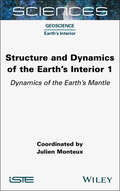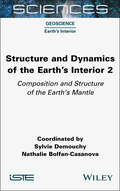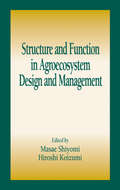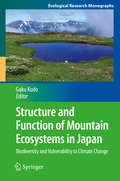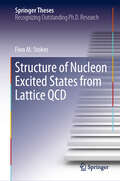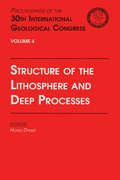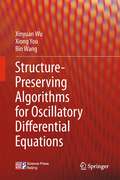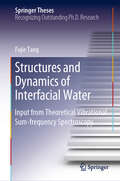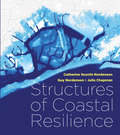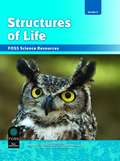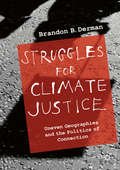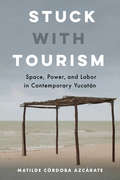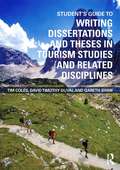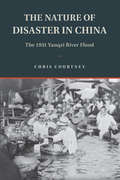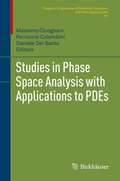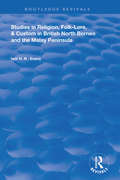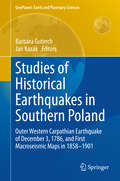- Table View
- List View
Structure and Dynamics of the Earth's Interior 1: Dynamics of the Earth's Mantle (ISTE Invoiced)
by Julien MonteuxThe silicate mantle and its dynamics have controlled the Earth's internal cooling for over four billion years. Today, these dynamics are rather slow, but this was not always the case: shortly after the core/mantle separation, this reservoir was significantly melted, with dynamics like those of a magma ocean. Despite advances in analytical and numerical tools and a better understanding of the Earth’s internal structure, the Earth's mantle currently remains a mystery. Structure and Dynamics of the Earth's Interior 1 presents the evolution of mantle dynamics throughout Earth’s history, from its formation to the present day. It examines the contributions of numerical modeling, as well as the seismological, petrological and geochemical data used to constrain dynamic models. Finally, the book analyzes the manifestations of mantle dynamics in terms of surface cooling, volcanism and coupling with the atmosphere.
Structure and Dynamics of the Earth's Interior 2: Composition and Structure of the Earth's Mantle (ISTE Invoiced)
by Sylvie Demouchy Nathalie Bolfan-CasanovaThe interior of our planet is one of the last 'terra incognita'. Its chemical composition and onion-like structure of solid rocks and rare minerals make it a fascinating object. It is primarily its dynamic that makes Earth such a singular object in the solar system, with perennial, active plate tectonics for several billion years. While its dynamic is obvious on the surface (earthquakes, volcanic eruptions, mid-oceanic rifts), the very nature of the Earth's mantle – beneath the crust and in contact with the core – has not revealed all of its secrets. Structure and Dynamics of the Earth's Interior 2 recalls the fundamental principles of several key physicochemical properties of the materials which make up the Earth's mantle. This book then describes the latest technological advances used at high pressures and temperatures to reproduce the extreme conditions of the Earth's mantle in the laboratory. It also presents the latest and most significant scientific results.
Structure and Function in Agroecosystem Design and Management (Advances in Agroecology)
by Masae Shiyomi Hiroshi KoizumiStructure and Function in Agroecosystem Design and Management presents an advanced discussion of the need to design agricultural systems that 1) increase reliance on biological interactions in agroecosystems as a means of decreasing dependence on the use of large quantities of agrochemicals and the consumption of fossil fuel energy and 2) continue
Structure and Function of Mountain Ecosystems in Japan
by Gaku KudoThe purpose of this book is to summarize new insights on the structure and function of mountain ecosystems and to present evidence and perspectives on the impact of climate change on biodiversity. This volume describes overall features of high-mountain ecosystems in Japan, which are characterized by clear seasonality and snow-thawing dynamics. Individual chapters cover a variety of unique topics, namely, vegetation dynamics along elevations, the physiological function of alpine plants, the structure of flowering phenology, plant-pollinator interactions, the geographical pattern of coniferous forests, terrestrial-aquatic linkage in carbon dynamics, and the community structure of bacteria in mountain lake systems. High-mountain ecosystems are characterized by unique flora and fauna, including many endemic and rare species. On the other hand, the systems are extremely vulnerable to environmental change. The biodiversity is maintained by the existence of spatiotemporally heterogeneous habitats along environmental gradients, such as elevation and snowmelt time. Understanding the structure and function of mountain ecosystems is crucial for the conservation of mountain biodiversity and the prediction of the climate change impacts. The diverse studies and integrated synthesis presented in this book provide readers with a holistic view of mountain ecosystems. It is a recommended read for anyone interested in mountain ecosystems and alpine plants, including undergraduate and graduate students studying ecology, field workers involved in conservational activity in mountains, policymakers planning ecosystem management of protected areas, and researchers of general ecology. In particular, this book will be of interest to ecologists of countries who are not familiar with Japanese mountain ecosystems, which are characterized by humid summers, cold winters, and the snowiest climate in the world.
Structure and Method in Aristotle's Meteorologica
by Malcolm WilsonIn the first full-length study in any modern language dedicated to the Meteorologica, Malcolm Wilson presents a groundbreaking interpretation of Aristotle's natural philosophy. Divided into two parts, the book first addresses general philosophical and scientific issues by placing the treatise in a diachronic frame comprising Aristotle's predecessors and in a synchronic frame comprising his other physical works. It argues that Aristotle thought of meteorological phenomena as intermediary or 'dualizing' between the cosmos as a whole and the manifold world of terrestrial animals. Engaging with the best current literature on Aristotle's theories of science and metaphysics, Wilson focuses on issues of aetiology, teleology and the structure and unity of science. The second half of the book illustrates Aristotle's principal concerns in a section-by-section treatment of the meteorological phenomena and provides solutions to many of the problems that have been raised since the time of the ancient commentators.
Structure of Nucleon Excited States from Lattice QCD (Springer Theses)
by Finn M. StokesQuantum Chromodynamics (QCD) describes the interactions between elementary quarks and gluons as they compose the nucleons at the heart of atomic structure. The interactions give rise to complexity that can only be examined via numerical simulations on supercomputers. This work provides an introduction to the numerical simulations of lattice QCD and establishes new formalisms relevant to understanding the structure of nucleons and their excited states. The research opens with an examination of the non-trivial QCD vacuum and the emergence of “centre domains.” The focus then turns to establishing a novel Parity-Expanded Variational Analysis (PEVA) technique solving the important problem of isolating baryon states moving with finite momentum. This seminal work provides a foundation for future calculations of baryon properties. Implementation of the PEVA formalism discloses important systematic errors in conventional calculations and reveals the structure of nucleon excited states from the first principles of QCD for the first time.
Structure of the Lithosphere and Deep Processes: Proceedings of the 30th International Geological Congress, Volume 4
by Hong DaweiThis book is a collection of papers presented in the 30th International Geological Congress, held in Beijing, on structure of the lithosphere and deep processes. The papers deal with topics on the measurement of P-wave velocities in rocks, and elastic properties of crust and upper mantle.
Structure-Preserving Algorithms for Oscillatory Differential Equations
by Bin Wang Xiong You Xinyuan WuStructure-Preserving Algorithms for Oscillatory Differential Equations describes a large number of highly effective and efficient structure-preserving algorithms for second-order oscillatory differential equations by using theoretical analysis and numerical validation. Structure-preserving algorithms for differential equations, especially for oscillatory differential equations, play an important role in the accurate simulation of oscillatory problems in applied sciences and engineering. The book discusses novel advances in the ARKN, ERKN, two-step ERKN, Falkner-type and energy-preserving methods, etc. for oscillatory differential equations. The work is intended for scientists, engineers, teachers and students who are interested in structure-preserving algorithms for differential equations. Xinyuan Wu is a professor at Nanjing University; Xiong You is an associate professor at Nanjing Agricultural University; Bin Wang is a joint Ph.D student of Nanjing University and University of Cambridge.
Structures and Dynamics of Interfacial Water: Input from Theoretical Vibrational Sum-frequency Spectroscopy (Springer Theses)
by Fujie TangThis book focuses on the study of the interfacial water using molecular dynamics simulation and experimental sum frequency generation spectroscopy. It proposes a new definition of the free O-H groups at water-air interface and presents research on the structure and dynamics of these groups. Furthermore, it discusses the exponential decay nature of the orientation distribution of the free O-H groups of interfacial water and ascribes the origin of the down pointing free O-H groups to the presence of capillary waves on the surface. It also describes how, based on this new definition, a maximum surface H-bond density of around 200 K at ice surface was found, as the maximum results from two competing effects. Lastly, the book discusses the absorption of water molecules at the water–TiO2 interface. Providing insights into the combination of molecular dynamics simulation and experimental sum frequency generation spectroscopy, it is a valuable resource for researchers in the field.
Structures of Coastal Resilience
by Julia Chapman Catherine Seavitt Nordenson Guy NordensonStructures of Coastal Resilience presents new strategies for creative and collaborative approaches to coastal planning for climate change. In the face of sea level rise and an increased risk of flooding from storm surge, we must become less dependent on traditional approaches to flood control that have relied on levees, sea walls, and other forms of hard infrastructure. But what are alternative approaches for designers and planners facing the significant challenge of strengthening their communities to adapt to uncertain climate futures?Authors Catherine Seavitt Nordenson, Guy Nordenson, and Julia Chapman have been at the forefront of research on new approaches to effective coastal resilience planning for over a decade. In Structures of Coastal Resilience, they reimagine how coastal planning might better serve communities grappling with a future of uncertain environmental change. They encourage more creative design techniques at the beginning of the planning process, and offer examples of innovative work incorporating flexible natural systems into traditional infrastructure. They also draw lessons for coastal planning from approaches more commonly applied to fire and seismic engineering. This is essential, they argue, because storms, sea level rise, and other conditions of coastal change will incorporate higher degrees of uncertainty—which have traditionally been part of planning for wildfires and earthquakes, but not floods or storms.This book is for anyone grappling with the immense questions of how to prepare communities to flourish despite unprecedented climate impacts. It offers insights into new approaches to design, engineering, and planning, envisioning adaptive and resilient futures for coastal areas.
Structures of Life (FOSS Science Resources)
by Delta Education<p>FOSS Science Resources is a book of original readings developed to accompany each module. The readings are referred to as articles in the Investigations Guide. Students read the articles in the book as they progress through the module. <p>The articles cover a specific concept usually after that concept has been introduced in an active investigation. The articles in FOSS Science Resources and the discussion questions provided in the Investigations Guide help students make connections to the science concepts introduced and explored during the active investigations. Concept development is most effective when students are allowed to experience organisms, objects, and phenomena firsthand before engaging the concepts in text. The text and illustrations help make connections between what students. </p>
Struggles for Climate Justice: Uneven Geographies and the Politics of Connection
by Brandon Barclay DermanThis book provides an accessible but intellectually rigorous introduction to the global social movement for ‘climate justice’ and addresses the socially uneven consequences of anthropogenic climate change.Deploying relational understandings of nature-society, space, and power, Brandon Derman shows that climate change has been co-produced with social inequality. Mismatching levels of responsibility and vulnerability, and institutions that emerged in tandem with those disproportionalities compose the terrain on which NGOs and social movements now contest climate injustice in a wide-ranging “politics of connection.” Case-based chapters explore the defining commitments of affected and allied communities, and how they have shaped specific struggles mobilizing human rights, international treaties, transnational activist forums, national and local constituencies, and broad-based demonstrations. Derman synthesizes these cases and similar efforts across the globe to identify and explore crosscutting themes in climate justice politics as well as the opportunities and dilemmas facing advocates and activists, and those who would ally with them going forward. How should we understand campaigns for climate justice? What do these initiatives share, and what differentiates them? What, in fact, does “climate justice” mean in these contexts? And what do the framing and progression of such efforts in different settings suggest about the broader conditions that produce and sustain climate injustice, how those conditions could be unmade, and what might take their place? Struggles for Climate Justice approaches these questions from an interdisciplinary perspective accessible to graduate and advanced undergraduate students as well as scholars of geography, social movements, environmental politics, policy, and socio-legal studies.
Struthers Revisited (Images of America)
by Patricia Ringos Beach Struthers Historical SocietyWhat more is there to say about Struthers that was not said in Images of America: Struthers, published in 2008? It turns out there is plenty. Images of America: Struthers Revisited features the people and places that filled this northeastern Ohio town in the 1900s. Through the growth and decline of the steel industry, the town prospered and adapted. Children grew up, marriages occurred, and people died; however, as anyone affiliated with Struthers knows, they could not be buried in the "city without a cemetery." This collection of images illustrates stories of accomplishment, struggle, and everyday life. Photographs of schools, churches, small grocery stores, businesses, eateries, parks, and playgrounds will transport readers to a time that is both familiar and historical. This walk down memory lane is for all ages. It is for those who reside in Struthers and those who used to live there and love to visit.
Stuck with Tourism: Space, Power, and Labor in Contemporary Yucatan
by Matilde Córdoba AzcárateTourism has become one of the most powerful forces organizing the predatory geographies of late capitalism. It creates entangled futures of exploitation and dependence, extracting resources and labor, and eclipsing other ways of doing, living, and imagining life. And yet, tourism also creates jobs, encourages infrastructure development, and in many places inspires the only possibility of hope and well-being. Stuck with Tourism explores the ambivalent nature of tourism by drawing on ethnographic evidence from the Mexican Yucatán Peninsula, a region voraciously transformed by tourism development over the past forty years. Contrasting labor and lived experiences at the beach resorts of Cancún, protected natural enclaves along the Gulf coast, historical buildings of the colonial past, and maquilas for souvenir production in the Maya heartland, this book explores the moral, political, ecological, and everyday dilemmas that emerge when, as Yucatán’s inhabitants put it, people get stuck in tourism’s grip.
Student's Guide to Writing Dissertations and Theses in Tourism Studies and Related Disciplines
by David Timothy Duval Gareth Shaw Tim ColesAround the world every year very many students have to complete dissertations or theses as part of their undergraduate or masters studies in tourism and related subjects. Often this substantial piece of self-directed work is the culmination of their programmes. More than just a means to consolidate their final grades, it is also an exciting chance to research a topic of their choosing and a potential gateway to more advanced study as well as job offers and future career paths. Yet for all these reasons, many students view the dissertation as a tricky challenge. This comprehensive book intends to take the stress and anxiety out of doing a dissertation in tourism studies and related disciplines. The process is examined from the germination of an idea to the submission and assessment of the final document. Written primarily for students conducting independent research for the first time, this book offers simple advice and a clear framework which students can adopt even in more advanced studies at masters and doctoral level. This book debunks popular myths, and aims to overcome common pitfalls. It focuses on the aims and objectives as the DNA of every dissertation. Rather than view it as a single, overwhelming project, the dissertation is presented as a series of more modest, manageable yet crucially inter-linked tasks that all students can successfully complete through careful preparation and effective time management. Dissertations are not to be underestimated and they demand great care and attention, but they can also be immensely rewarding and enriching experiences academically and personally. This ‘jargon free’ book is also written with overseas students specifically in mind, drawing directly on our overseas students’ experiences. This valuable resource contains start of chapter learning objectives and end of chapter checklists, as well as numerous boxed case studies, to further help assist students through their dissertation.
Students' Dictionary of Zoo and Aquarium Studies
by Dr Paul ReesThis Students' Dictionary of Zoo and Aquarium Studies contains over 5,000 terms (illustrated by 88 figures) used in zoos, aquariums, safari parks, birds of prey centres, petting zoos, animal rescue centres and other facilities that make up the 'zoo industry'. It covers a wide range of topics including animal behaviour, animal husbandry, animal welfare, ecology, law, taxonomy, classification, nutrition, parasitology, physiology, reproduction, experimental design, statistics, veterinary science, disease, visitor studies, water management, wildlife conservation and zoo design and architecture. It should be of great interest to those studying zoo biology, animal management, veterinary science and related subjects along with zookeepers and aquarists in the early stages of their careers. Dr Paul Rees has a long-standing interest in animals and in zoos. He has taught a wide range of subjects including ecology, animal behaviour, zoo biology, and wildlife and zoo law. While lecturing at the University of Salford he created the first undergraduate programme in Wildlife Conservation and Zoo Biology in the United Kingdom and over a period of some 20 years was an external examiner for BSc and MSc programmes in zoo biology and wildlife conservation at the Universities of Edinburgh, Chester, Staffordshire, Wolverhampton, Gloucestershire and Nottingham Trent University. Dr Rees has published research on the large mammal fauna of Ngorongoro Crater, Tanzania, the ecology and behaviour of elephants and cheetahs living in zoos, and the laws concerning wildlife reintroductions and the regulation of zoos.
Studies in Canadian Geography: Ontario
by R. Louis GentilcoreOntario is the most populous and most prosperous province in Canada. One-third of the nation's population lives here. They produce more than one-half of Canada's manufactured goods, one-quarter of her output from mines and forests, and one-third of the farm income. Accompanying this economic pre-eminence is a majestic primeval geography. Ontario extends through sixteen degrees of latitude and a distance of over 1600 kilometres from barren tundra along a saltwater shoreline in the north to fertile lowlands bordering freshwater lakes in the south. Productivity and size, two of the basic elements in the geography of the province, stand in contradiction to one another. The former is concentrated in a very small area with an identity and even a name of its own, 'Southern Ontario,' a portion of the province that is as overwhelming in its concentration of activity as the remainder is in its areal extent. The recognition of this distinction is a prerequisite to the further study of a subject which has been widely neglected, both in Ontario and in the rest of Canada. Writers and artists, historians and geographers have paid little attention to the province. It is a baffling region, one which 'has achieved a significant place in the Canadian sun, but no one quite knows what the place is, even though other areas would like to achieve the same position' (Warkentin 1966). The purpose of this short volume is to contribute to an understanding of Ontario, to point out something of what it is both to those who are already acquainted with the province and to those who are being introduced to it for the first time.
Studies in Environment and History: Across Forest, Steppe, and Mountain
by David A. BelloIn this book, David Bello offers a new and radical interpretation of how China's last dynasty, the Qing (1644–1911), relied on the interrelationship between ecology and ethnicity to incorporate the country's far-flung borderlands into the dynasty's expanding empire. The dynasty tried to manage the sustainable survival and compatibility of discrete borderland ethnic regimes in Manchuria, Inner Mongolia, and Yunnan within a corporatist 'Han Chinese' imperial political order. This unprecedented imperial unification resulted in the great human and ecological diversity that exists today. Using natural science literature in conjunction with under-utilized and new sources in the Manchu language, Bello demonstrates how Qing expansion and consolidation of empire was dependent on a precise and intense manipulation of regional environmental relationships.
Studies in Environment and History: Empire of Timber
by Erik LoomisThe battles to protect ancient forests and spotted owls in the Northwest splashed across the evening news in the 1980s and early 1990s. Empire of Timber re-examines this history to demonstrate that workers used their unions to fight for a healthy workplace environment and sustainable logging practices that would allow themselves and future generations the chance to both work and play in the forests. Examining labor organizations from the Industrial Workers of the World in the 1910s to unions in the 1980s, Empire of Timber shows that conventional narratives of workers opposing environmental protection are far too simplistic and often ignore the long histories of natural resource industry workers attempting to protect their health and their futures from the impact of industrial logging. Today, when workers fear that environmental restrictions threaten their jobs, learning the history of alliances between unions and environmentalists can build those conversations in the present.
Studies in Environment and History: The 1931 Yangzi River Flood (Studies in Environment and History)
by Chris CourtneyIn 1931, China suffered a catastrophic flood that claimed millions of lives. This was neither a natural nor human-made disaster. Rather, it was created by an interaction between the environment and society. Regular inundation had long been an integral feature of the ecology and culture of the middle Yangzi, yet by the modern era floods had become humanitarian catastrophes. Courtney describes how the ecological and economic effects of the 1931 flood pulse caused widespread famine and epidemics. He takes readers into the inundated streets of Wuhan, describing the terrifying and disorientating sensory environment. He explains why locals believed that an angry Dragon King was causing the flood, and explores how Japanese invasion and war with the Communists inhibited both official relief efforts and refugee coping strategies. This innovative study offers the first in-depth analysis of the 1931 flood, and charts the evolution of one of China's most persistent environmental problems.
Studies in Environment and History: The Nature of Soviet Power
by Andy BrunoDuring the twentieth century, the Soviet Union turned the Kola Peninsula in the northwest corner of the country into one of the most populated, industrialized, militarized, and polluted parts of the Arctic. This transformation suggests, above all, that environmental relations fundamentally shaped the Soviet experience. Interactions with the natural world both enabled industrial livelihoods and curtailed socialist promises. Nature itself was a participant in the communist project. Taking a long-term comparative perspective, The Nature of Soviet Power sees Soviet environmental history as part of the global pursuit for unending economic growth among modern states. This in-depth exploration of railroad construction, the mining and processing of phosphorus-rich apatite, reindeer herding, nickel and copper smelting, and energy production in the region examines Soviet cultural perceptions of nature, plans for development, lived experiences, and modifications to the physical world. While Soviet power remade nature, nature also remade Soviet power.
Studies in Environment and History: Waste into Weapons
by Peter ThorsheimDuring the Second World War, the United Kingdom faced severe shortages of essential raw materials. To keep its armaments factories running, the British government enlisted millions of people in efforts to recycle a wide range of materials for use in munitions production. Recycling not only supplied British munitions factories with much-needed raw materials - it also played a key role in the efforts of the British government to maintain the morale of its citizens, to secure billions of dollars in Lend-Lease aid from the United States, and to uncover foreign intelligence. However, Britain's wartime recycling campaign came at a cost: it consumed items that would never have been destroyed under normal circumstances, including significant parts of the nation's cultural heritage. Based on extensive archival research, Peter Thorsheim examines the relationship between armaments production, civil liberties, cultural preservation, and diplomacy, making Waste into Weapons the first in-depth history of twentieth-century recycling in Britain.
Studies in Phase Space Analysis with Applications to PDEs
by Daniele Del Santo Ferruccio Colombini Massimo CicognaniThis collection of original articles and surveys, emerging from a 2011 conference in Bertinoro, Italy, addresses recent advances in linear and nonlinear aspects of the theory of partial differential equations (PDEs). Phase space analysis methods, also known as microlocal analysis, have continued to yield striking results over the past years and are now one of the main tools of investigation of PDEs. Their role in many applications to physics, including quantum and spectral theory, is equally important. Key topics addressed in this volume include: *general theory of pseudodifferential operators *Hardy-type inequalities *linear and non-linear hyperbolic equations and systems *Schrödinger equations *water-wave equations *Euler-Poisson systems *Navier-Stokes equations *heat and parabolic equations Various levels of graduate students, along with researchers in PDEs and related fields, will find this book to be an excellent resource. Contributors T. Alazard P.I. Naumkin J.-M. Bony F. Nicola N. Burq T. Nishitani C. Cazacu T. Okaji J.-Y. Chemin M. Paicu E. Cordero A. Parmeggiani R. Danchin V. Petkov I. Gallagher M. Reissig T. Gramchev L. Robbiano N. Hayashi L. Rodino J. Huang M. Ruzhanky D. Lannes J.-C. Saut F. Linares N. Visciglia P.B. Mucha P. Zhang C. Mullaert E. Zuazua T. Narazaki C. Zuily
Studies in Religion, Folk-Lore, and Custom in British North Borneo and the Malay Peninsula (Routledge Revivals)
by Ivor H. EvansOriginally published in 1923, the following papers contain the results of investigations concerning religion and custom in Borneo and the Malay Peninsula, which were carried out at intervals during the years 1910 to 1921 by the author. It includes chapters on the customs and beliefs of the 'Orangdusun', beliefs and customs of the Sakai, and Malay folk-tales.
Studies of Historical Earthquakes in Southern Poland
by Barbara Guterch Jan KozákThis book examines old and new data on some of the 18th and 19th century earthquakes that either occurred or were clearly felt in southern regions of Poland. Particular emphasis is put on a detailed study and reinterpretation of the unusually severe Outer Western Carpathians earthquake on December 3, 1786 (7 I0, 5. 3 Mw, 35 km depth), which was the last in a series of seismic events in the years 1785 and 1786. An assessment is also made of what we presently know about the seismicity of the Western Carpathians in Poland based on to instrumental data. The book also presents material relating to earthquakes of 6-9 I0 that affected south Poland and the surrounding regions: Žilina in Slovakia (1858), Gera in Thuringia (1872), the Sudetes on the Czech-Polish border (1883, 1901), and Lower Silesia, Poland (1895). These are analyzed and illustrated by 17 contemporary macroseismic intensity maps, some of which are considered to be remarkable for those times. A new seismic catalog for Poland is provided with amendments and updates up to the end of 2014. Noteworthy is the data on two unforeseen events: one about 60 km NE of the Polish border in 2004 and one in central Poland in 2012. It shows how important it is, not least for practical engineering purposes, to perform seismic monitoring even in seemingly aseismic regions.
